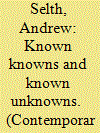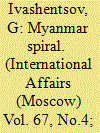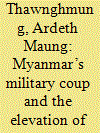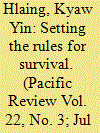|
|
|
Sort Order |
|
|
|
Items / Page
|
|
|
|
|
|
|
| Srl | Item |
| 1 |
ID:
119084


|
|
|
|
|
| Publication |
2013.
|
| Summary/Abstract |
In 2011, after more than 20 years of direct rule, the Tatmadaw transferred formal authority to a nominally civilian government following Myanmar's first multi-party election since 1990 as part of a transformation of the political system to a presidential republic. Within this new arena, though, electoral manipulations and constitutional stipulations have brought to power a government consisting mostly of former military officers who are closely aligned to the Tatmadaw. These reforms, therefore, have changed the nature and organization of the ruling regime from that of a military one to an Electoral Authoritarian form. Elections now have become the main conduit to accessing power. Despite the maintenance of authoritarian rule (and the unclear motivations promoting such system change) the opening of the political realm and civil society creates avenues for new actors, identities, interests, and relationships to be constructed. A number of developments over the past few years are tentatively positive signs that Myanmar is undergoing a fundamental political change distinct from the years of military rule. In particular, the interactions of actors within and across civil-military, central-regional, and foreign relations will come to define the future trajectory of these reforms. Ultimately, the willingness of the Tatmadaw to abandon its praetorian ethos of directing the political process, specifically over security policy areas, will determine whether the system remains primarily in the service of regime maintenance or becomes an arena of increasingly diverse, free, and fair political discord with the possibility of power being assumed by those that are non-military.
|
|
|
|
|
|
|
|
|
|
|
|
|
|
|
|
| 2 |
ID:
089914


|
|
|
|
|
| Publication |
2009.
|
| Summary/Abstract |
As then US Defense Secretary Donald Rumsfeld stated in characteristic fashion, some security issues are easily researched and well understood, while others pose greater problems. Failure to recognize these "known knowns" and "known unknowns", or to acknowledge information gaps, can lead to misconceptions and errors of judgement. There are also mysteries - the "unknown unknowns". The study of Myanmar's armed forces (or Tatmadaw) is a case in point, yet anyone attempting to study them faces problems at three levels. At the first are the traps lying in wait for all who engage in such intellectual exercises, and strive for precision, balance and objectivity. At the second level are the challenges inherent in the study of any country's military capabilities. At the third level are the difficulties encountered by anyone studying modern Myanmar. Due mainly to the lack of reliable data, however, an accurate, detailed and nuanced assessment of Myanmar's military capabilities is currently impossible. It is difficult even to make judgements about its order of battle and defence expenditure, let alone the Tatmadaw's combat proficiency. Yet these kinds of issues are critical to an understanding of Myanmar's security
|
|
|
|
|
|
|
|
|
|
|
|
|
|
|
|
| 3 |
ID:
181355


|
|
|
|
|
| Summary/Abstract |
ACCORDING to the ancient Greek writer and historian Xenophon, the development of history is cyclical. This idea is almost 2,500 years old. Is it applicable to the current situation in the Republic of the Union of Myanmar?
|
|
|
|
|
|
|
|
|
|
|
|
|
|
|
|
| 4 |
ID:
178407


|
|
|
|
|
| Summary/Abstract |
The military overthrow of Myanmar’s elected government in February 2021 has again thrown into upheaval the troublesome relationship between civilian politicians and armed forces that has plagued the country since its first military coup in 1962. t has also brought back into view the relationship between Myanmar’s Bamar majority and the country’s ethnic minorities, a fractious issue that has long been subject to band-aid and patchwork solutions that skirt around the deeper causes of minority disaffection. Myanmar’s minority groups have long-standing grievances against the repression and brutality of the Bamar-dominated military and feel marginalized. Their attitude to the Bamar-dominated National League for Democracy (NLD) government of 2016-2021, led by Aung San Suu Kyi until her ouster and arrest, was one of despair at the continuing death and destruction brought by civil conflict, dismay at the silence of political leaders on the plight of civilians displaced by war, and anger at the quasi-authoritarian policies by the civilian administration. These dynamics have helped determine allegiances in the ongoing protests against military rule, pressed the ousted government into changing its policies to better reflect minority aspirations, and will likely transform Myanmar’s political landscape in a manner that would have been inconceivable before the coup.
|
|
|
|
|
|
|
|
|
|
|
|
|
|
|
|
| 5 |
ID:
166808


|
|
|
|
|
| Summary/Abstract |
The Tatmadaw (the Myanmar armed forces) and the Royal Thai Armed Forces (RTAF) are two of the most resilient and enduring politically active militaries in the world, engaging in a decades long process of the institutionalization of a system of military tutelage. There are, however, significant differences in the strategies pursued and the degree of success achieved in each. These variations are due to the combination of three factors creating the environmental context within which they have pursued these projects: (1) the existence of political allies and cohesiveness of the military; (2) degree of unification of domestic opposition elements against them; and (3) international pressures and influences. Based on a Historical Institutionalist perspective, this paper will map the interplay of these factors over time within each case to explain the different pathways these projects have proceeded. With a lack of allies, a fragmented opposition, and various degrees of international pressure the Tatmadaw has been unsuccessful in creating a durable system of tutelage, resulting in lengthy periods of direct rule while attempting wholesale recreations of the state. In Thailand, the RTAF’s alliance with the Monarchy combined with a fragmented but at times united opposition and weak international pressure has resulted in frequent coups to remove elected governments, but usually for short durations resulting in their limited institutionalization into the political system. The current democracy projects in both states, in part due to domestic and international pressures, are not about replacing but rather embedding the military’s involvement in the political system, though their freedom of action has been constrained to a certain extent. Myanmar and Thailand are best characterized as perpetual transitions as an intentional project to maintain a defective-democratic, tutelary system. Defective in that the military maintains the prerogative to involve itself in electoral politics and tutelary in that the military has cordoned off reserve domains of policy which ensure the system, regardless of who is in charge, supports their interests.
|
|
|
|
|
|
|
|
|
|
|
|
|
|
|
|
| 6 |
ID:
089922


|
|
|
|
|
| Publication |
2009.
|
| Summary/Abstract |
Regardless of its growing unpopularity, the ruling military junta in Burma remains far stronger than any of its foes in the country. This article probes how the junta managed to remain in power for such a long time. The answer lies in the informal procedures that governed the way leading members of the junta dealt with their differences and disagreements with their colleagues. Deriving from the rules of engagement within the military established by former military dictator Ne Win, two features came to epitomize the organizational culture of the Tatmadaw (armed forces). The first of these is the maintenance of incriminating evidence against senior members of the military in the event that they fall out of favour or need to be disciplined. The second feature of this culture that has now taken root is the observance of discrete domains of operation. This latter feature allows for the dissipation of tension between officers who are unable to get along well with each other. Importantly, it also prevents a senior officer from acquiring sufficient power to challenge more senior officers within the Tatmadaw hierarchy. Once certain rules became established norms of the Tatmadaw, they came to influence the actions and strategies taken by military officers. The rules that governed the ways military officers interacted with the colleagues they did not get along with and the incentives the Tatmadaw as an organization has created for its members have kept it together. Therefore, regardless of external and internal pressures, the army remains the most organized institution in Burma and appears to be more unified now than ever before.
|
|
|
|
|
|
|
|
|
|
|
|
|
|
|
|
|
|
|
|
|